Final report for WSP18-010
Project Information
The 2019 – 2020 Montana WSARE PDP proposal seeks to enable agricultural professionals to provide outreach and education to farmers, ranchers and other Montana citizens on sustainable agricultural principles and practices. The focus of this outreach and education will be the cornerstones of sustainable agriculture: environmental preservation, public health protection, vibrant community maintenance and animal welfare protection. To achieve this the following objectives have been identified: 1) provide professional development opportunities to improve agricultural professional’s knowledge and understanding of sustainable ag, 2) facilitate development of sustainable agriculture outreach opportunities, 3) Increase grower engagement in sustainable agriculture programming and practices, and 4) evaluate, communicate and report the Montana PDP activities. Areas of specific emphasis will be toward improving knowledge, skills and abilities in soil health, crop diversification and rotations, climate variability impact mitigation, forage quality and resource management for livestock, cover crop/livestock integration, value-added food and farm-to-table programming.
1) provide professional development opportunities to improve agricultural professional’s knowledge and understanding of sustainable ag, 2) facilitate development of sustainable agriculture outreach opportunities, 3) Increase grower engagement in sustainable agriculture programming and practices, and 4) evaluate, communicate and report the Montana PDP activities.
Advisors
- (Educator and Researcher)
- (Educator)
- (Educator)
Education
The educational approach of the Montana WSARE Professional Development Grant Program is to provide opportunities for professional development for agricultural professionals such as Extension Agents, Research Scientists, Agronomists, Agency personnel, and agricultural trainers and educators. This is done through a mini-grant and travel scholarship award program. The idea is to provide opportunities for these professionals to learn and return to their communities to provide further education to farmers, producers, and community members. The key areas that have been awarded for 2019 are: travel scholarships, workshop/conferences, agricultural tours, and demonstration plots.
Education & Outreach Initiatives
To provide professional development workshops and conferences to agricultural professionals, research scientists, agronomists, government agencies, Non-profit organizations, and farmer/producers. These opportunities will provide opportunities for agricultural professionals to provide education and outreach in sustainable agricultural practices in a variety of climes and locales.
Montana awarded 5 workshop/conference mini-grants for 2019. The grants funded an Integrated Pest Management 2-day workshop in Bozeman, a one-day workshop on Palmer amaranth identification and management in Sidney and online, a Montana Organic conference - "Cultivating Legally Resilient Farms", a drone workshop held consecutively in two Montana Counties, and a range and forest management workshop in Meagher county.
Integrated Pest Management (IPM) Workshop
The IPM workshop provided an advanced interactive approach to integrated pest management. The morning sessions were filled with discussion and the afternoon sessions were all hands-on, field activities. Topics discussed were a research project by Dr. Judit Barroso at OSU on weed seed control at harvest in small grain crops using mechanical methods; covercrops to manage weeds; bio-control of Canada thistle; herbicide resistant weeds in MT; soil acidification and its impact; herbicide persistence and performance; and Palmer amaranth update. Field activities included: weed seedling identification, herbicide injury diagnosis, and managing perennial weeds in organic cropping systems.
Palmer Amaranth Workshop
The Palmer amaranth workshop was held online and in person in Sidney Montana. Palmer amaranth is not currently found in Montana, but was identified in neighboring North Dakota in 2018 and 2019, so it is expected that it will be found in Montana in the near future. The speakers included Dr. Jason Bond from Missouri State University,Dr. John Gaskin from the Eastern Agricultural Research Center, Tim Seipel from MSU, and Dr. Brian Jenks from NDSU. The program taught 129 Extension agents, researchers, certified crop advisors, Agency persons and producer/farmers about how this weed has become such a problem, its genetic variability and tendency toward herbicide resistance, and how to identify the weed. The speakers further identified the protocols to take if you suspect you have Palmer amaranth on your property. Dr. Seipel and Dr. Brian Jenks talked about herbicide resistance and how to reduce the likelihood of occurrence in fields. Also discussed was the use of drones in scouting fields for plants.
Cultivating Your Legally Resilient Farm by Farm Commons Workshop
The Montana Organic Association hosted a workshop on Cultivating Legally Resilient Farms, by inviting Rachel Armstrong of Farm Commons to speak. The topics she covered were business structures, land purchasing and leasing, food safety, employees, interns and volunteers, agrotourism, and adding value to farm products.
Drone Workshop
Tracy Mosley and Alison Kosto hosted a workshop on the use of drones in agriculture. Speakers discussed the use of technology for improved production efficiency through the use of drones in cropland, research, and weed management. The team also discussed FAA regulations and licensing requirements and provided a field demonstration of the various types of drones. The two locations brought in a total of 78 participants - mostly farmer/ranchers, but included researchers, extension personnel, crop advisers and agency personnel.
Range and Forest Management Workshop
The fifth workshop was a two-day Range and Forest management workshop in Meagher county, where ranchers learned how to improve their grazing capacity and reduce fire risk, through cheatgrass management on the first day. The methods discussed for cheatgrass control included a research project involving the use of the herbicide Esplanade, use of drones for herbicide targeting, and rotational grazing to improve range performance. The second day was devoted to forest management practices for improving forage production, reducing fire risk and for improving marketability of forest products through proper management.
IPM Workshop
Attendees of the IPM workshop found the herbicide resistance and diagnosis were the most useful topics of the conference. Also mentioned as being useful new knowledge were the discussions of soil acidification, Canada thistle management in organic systems and weed seedling identification. 83% of the surveyed respondents reported that they experienced an increase in confidence to present and integrated approach to pest management to their clients. All the attendees indicated that they improved their knowledge and ability to provide IPM suggestions to their constituents.
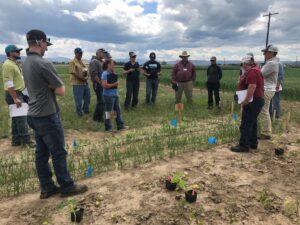
Palmer Amaranth Workshop
The Palmer amaranth workshop lasted 3.5 hours and had a total of 49 participants at the Richland Co. Extension office. There were 18 locations that participated via WebEx including: The Montana Dept. of Ag, NWARC, WARC, NARC, MSU Bozeman, Daniels Co., Deer Lodge Co., Powder River Co., Glacier Co., Sheridan Co., and several others. In total, we had 80 participants connect remotely for the workshop. The audience included farmers, industry representatives, scientists, county agents and three government officials from the Montana Department of Agriculture.
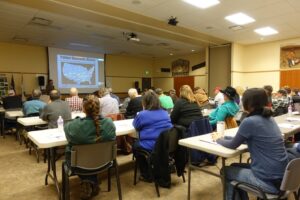
The hosts of the Palmer amaranth workshops conducted a survey to determine changes in knowledge, behavior and skills. One hundred percent of attendees learned something new that they didn't know before, agreed to implement what they learned and agreed to share the information that they learned. Unintended outcomes of the workshop included the establishment of a Palmer amaranth task-force for Montana, planning for additional future workshops across the state, and scouting of high risk fields by Extension agents.
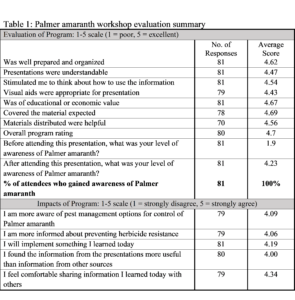
Cultivating Legally Resilient Farms
The 2019 Montana Organic Association (MOA) meeting was attended by 39 farmers and producers. Based on the evaluation tool used by MOA, the information sharing has led to a better understanding of issues of farm law and when a farmer should seek professional help. Participants also indicated an increased ability to identify deficits in their current operating plans and how to rectify the deficiencies for a more economically sustainable operation. Participants indicated that they now knew where to go to get information regarding legal issues. After completing the workshop 90% of the attendees indicated they have a greater incentive to seek legal counsel with all the attendees indicating that the workshop helped them identify issues in which they would seek professional advice. Other actions that participants intend to put into action immediately were: forming an LLC or corporation; writing an organizing document; shopping for new/additional liability insurance; updating property insurance coverage; changing employee classifications; modifying employee compensation and management plans; and putting leases into writing.
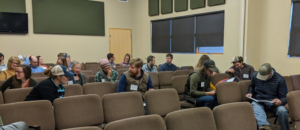
Drone Workshop
The drone workshop was held in two locations for 78 participants. Thirty-two farmers and 10 government/commercial applicators were able to receive continuing education credits for pesticide licensing through this workshop. In an evaluation of the program, 100% of the participants rated the workshop good (39%) to excellent (65%). Participants indicated that they were more knowledgeable in the following content areas: included: uses of UAV's on agricultural enterprises for cropland management (98%); uses of UAV's for rangeland and invasive species management (97%); uses of UAV's for integrated pest management (83%); FAA regulations, licensing and permitting requirements (88%); and UAV equipment and software options available and the associated costs of each (83%). Six participants indicated that they would be purchasing or investigating the purchase of a drone for their operation. Fifteen participants expressed in learning more about UAV's and their utility on their farms and ranches for: crop insurance adjusting; affordabiltiy for weed management, range applications, ranching, and other general uses; monitoring technological advances, software developments, and photogrammetry advancements; and learning more about UAV's in general and their uses.
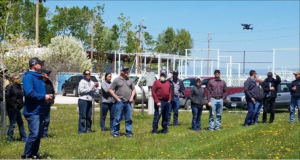
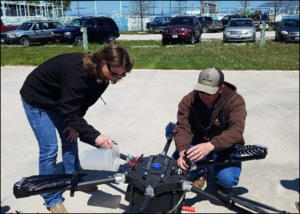
Range and Forest Management Workshop
The range and forest management workshop allowed growers to engage with research specialists and university faculty on a down-to-earth level and gave all parties a new perspective. The producers gained knowledge of the concept of forest management to improve marketability of their trees as forest products, which also improves their ranch sustainability through economic benefit. The workshop brought about an improved understanding of the relevance of production needs and how managing the invasive plant, cheatgrass can improve water retention and lead to improved diversity and native species regrowth. Participants have a greater understanding of impacts from forage management and how thinning trees opens up the canopy which leads to increased forage production and allows the remaining trees to gain girth and become more marketable.
Impacts and Benefits of this Initiative:
As a result of these 5 workshops, Montana grower/producers and agricultural professionals have satisfied human needs through: finding new value-added enterprises such as timber production on forested rangelands, the knowledge and skills to operate legally resilient farms, and the development of skills for using drones to enhance agricultural and livestock production and as a new business venture. Environmental sustainability was enhanced through increased water holding capacity of the soil through the proper management of forest canopies and targeted cheatgrass control; improved wildlife habitat through mitigation of cheatgrass infestations, improved biodiversity through weed management in forests, croplands and rangelands (Range and forest management, IPM, and Palmer amaranth workshops). Crop and livestock production was improved through strategies taught to manage weeds to improve yield, reduce input use, improve crop quality, and reduce pest incidence in the IPM, range and forest management, Palmer amaranth, and drone workshops. Social sustainability was enhanced through knowledge gained in the workshops regarding networking with other farmers/ranchers and gaining satisfaction with farming and ranching.
Montana PDP mini-grants for travel scholarships are intended to enhance the knowledge skills and abilities of agricultural professionals to share with other professionals, farmers/ranchers, and the communities in Montana upon their return.
Two travel scholarships were awarded in Montana in 2019.
Haskap Workshop, Saskatoon Saskatchewan
Dr. Zach Miller, Superintendent of the Western Agricultural Research Center (WARC) led a team of 5 Extension faculty to a workshop in Saskatoon Saskatchewan Canada, on Haskap (honeyberry) Production and Fruit Production for Cold Climates. Topics for the first day of the workshop included: genetic diversity, plant physiology, fruit development & chemistry, pest & pest management, plant nutrition, cultivation, and production. the second day was devoted to orchard establishment strategies, harvest practices and a breeding program being developed in Russia.
Range Beef Cattle Symposium, Scottsbluff Nebraska
A travel scholarship was given to Dr. Megan van Emon (MSU Beef Specialist) to attend the Range Beef Cattle Symposium in Nebraska. Megan was able to take 14 Extension educators and 2 Specialists to the conference with a generous donation of registration payment for attendees from Montana Extension regional department heads. Several of the agents attended the Beef Quality Assurance pre-conference event prior to attending the general session. Topics covered at the general session of the seminar included livestock nutrition, herd management, reproduction, genetics, financial management, grazing management and meat science. Additional presentations called "bullpen" sessions were also attended by some of the MSU faculty for an additional out of pocket fee. Attendees were also able to interact, engage, and network with industry leaders at the trade show.
Haskap Workshop Saskatoon Saskatchewan
Upon return Dr. Miller and his associates that attend the Haskap workshop presented 7 events related to the information that they learned at the conference, despite having their proposal only partially funded. The outreach activities reached over 300 stakeholders directly and thousands were reached indirectly through Dr. Miller's appearance on the popular television show Montana PBS's Montana Ag. Live.
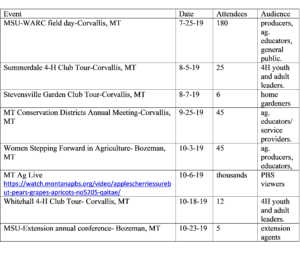
All five of the attendees reported an increase in knowledge and skills from attendance of the workshop. Not only did they gain practical horticultural skills that they have/will share with their clients/stakeholders, the participants also gained valuable insights into the needs of beginning farmers and of this emerging cold-hardy berry industry. The participants also reported an increased appreciation for the need for research to address production challenges and the complex and varied challenges faced by producers to manage the orchard, harvest, post-harvest processing, and marketing. Collaborative relationships were established and improved among the group of attendees and with the experts in Saskatchewan. Plans to have speakers/researchers from the workshop present at Montana events are in the works and two of the MSU faculty that attended will be presenting at an international conference in Nova Scotia in the fall of 2020.
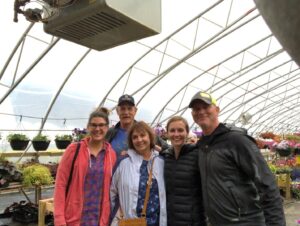
Range Beef Cattle Symposium, Scottsbluff Nebraska
Dr. van Emon conducted a survey of the Montana participants to learn about their knowledge, skills and abilities gained and changes in behavior as a result of their attendance of the symposium. Agents increased their knowledge in the following content areas: reproductive physiology, genetics, nutrition, health, cattle leases, succession planning, operation diversification, beef markets, grazing dynamics, and alternative meats. Ten agents ranked the alternative meats topic as their favorite presentation for Tuesday and colostrum quality and working dog demonstrations as their favorites for Wednesday. Overall 9 agents ranked their symposium experience as a 4 out 5, and eleven agents said they would attend the conference again. Testimonials from the attending agents included: "I thought the conference was very interesting and had very relevant topics. I believe I will be able to use a lot of the information that was sharedin future programming.", and "It was a great learning environment and the education was top notch. I thought we had wonderful presence and a great group of agents and specialists. We should continue to go and learn".

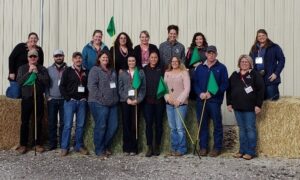
Impacts and Benefits of the Initiative
Both of these scholarships increased the knowledge, skills, and abilities of the attendees and empowered them to return to their offices and share their new knowledge with their clientele. The areas of sustainability that these events have benefited are: Economic stability through increased business opportunities and expanded enterprises, improved market opportunities through wholesale production, access to new market channels, and retail sales. The Haskap berry conference benefited environmental stability through the increase in biodiversity, habitat production for pollinators and carbon sequestration that will follow the education, training and assistance of farmers in setting up orchards and haskap berry businesses. By attending the Range Beef Cattle Symposium livestock production and efficiency will be enhanced by the use of the knowledge gained to increase the yield/animal, yield /unit land, reduced inputs, greater livestock quality and health and mitigation of disease and pest incidence.
Both of these activities benefited social sustainability by improving the quality of life of farm and ranch families through knowledge, skills and leaderships that strengthen rural and urban communities across Montana.
On-farm demonstrations provide hands-on activity based learning for participants. Demonstrations help farmer/ranchers and clients see and understand key concepts as well as gain a more clear understanding of techniques and strategies needed for producing agricultural products.
Liz Werk, FRTEP (Federally Recognized Tribes Extension Personnel) agent for the Fort Belknap tribe received a mini-grant award to set up a field demonstration plot that allowed for the direct growing, harvesting and evaluation of unique lower glucose release potato varieties such as Huckleberry Gold. Growth of these varieties served to create a positive health economics function by creating nutritious, locally grown produce while expanding local farm economics. The garden plot was donated by the Wasay Wakpa Community Council and prepared by local farmers and volunteers. Maintenance and support for the garden was conducted by community members while the research activities (evaluation) was completed by MSU Extension staff and an intern. The team developed an informal evaluation tool to address crop performance, pest resistance, visual appeal, flavor and nutritional characteristics of the varieties. An initial educational workshop was presented by MSU Extension faculty on varieties being grown, inputs, sowing, care and maintenance of the potato plants. Native American populations struggle with diabetes and access to lower glucose release potato varieties could improve the health and sustainability of the tribe.
Participants of the demonstration increased their overall sustainability of long-term potato production on both large and small farm/garden applications. The purchase of Montana certified seed potatoes in bulk, helped to expand the size and production of the plot. The harvest of the plot was much greater than anticipated and the community was able to sell potatoes at the Hays Harvest festival in September. Potatoes were freeze-dried at the Red Paint community kitchen for preservation and later use. These additional benefits of the demonstration plot added to the knowledge, skills, and abilities gained by the participants.
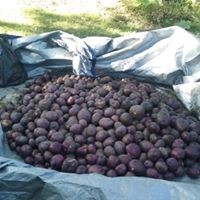
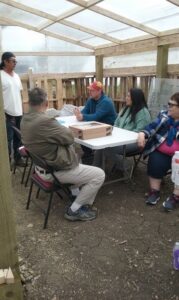
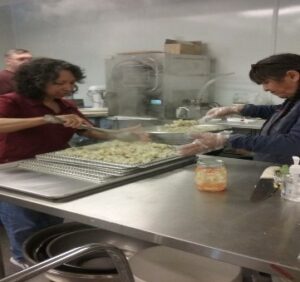
Benefits and Impacts of the Initiative
The potato demonstration plot proved to be beneficial to the economic sustainability of Fort Belknap Reservation communities by providing a new market with a big impact on return on labor and investment. The potatoes have provided access to a new enterprise and developed the skills of those particpating. The participants also benefited through improved crop production and efficiency by providing a new crop for farmers and home gardeners alike. But the largest benefit is to the social sustainability throught the improved agricultural and food system infrastructure. Participants are able to sell excess production as well as preserve portions for later use. These meet the criteria for new market outlets in the community, new sales in under-served communities, food affordability, community connections, and acquisition of new knowledge, skills and leadership capacity into the next generation that strengthens rural and urban communities.
Farm and agricultural industry tours provide a unique learning opportunity for agricultural professionals to learn and experience agricultural production at the grass roots level. This experience can give the participants an unique insight into the struggles and successes for both farmer and industry representatives.
Montana WSARE PDP supported to agricultural tours for Extension agents in 2019.
Ag Agent Update Tour
Tim Fine, VP for the Montana Association of County Agricultural Agents hosted a tour of local farming/ranching and agricultural production for Montana Extension Ag Agents at their spring update in Sidney Montana. Stops for the tour included the Williston (ND) Research Extension Center where the topics discussed were Palmer amaranth and its potential threat to Montana, Plant pathology collaboration between North Dakota and Montana, NDSU Horticultural research trials, intercropping studies, and the NDSU foundation and breeding programs. This was followed by a walking tour with representatives of the Montana Schutter Diagnostic lab to identify tree pests and disease problems in the Sidney area. The second day involved a tour of Wayne Berry's ranch that utilizes an intensive grazing system in it's operation. The topics discussed at this location included USDA/ARS studies of renovating CRP (Conservation Reserve Program acres), solar pumps used for livestock watering, intensive (mob-style) grazing strategies, and shelterbelt planning, maintenance and restoration. The second stop of the day was a hemp farm owned by Beau Anderson to discuss hemp production from a growers perspective and the challenges and successes that he has faced in trying a new crop and market. Also discussed on the tour were research initiatives being led by the USDA/ARS lab in Sidney and it's implications for farmers and ranchers across Montana; and the research projects being conducted by the Eastern Agricultural Research Center (EARC) which included: pulse diseases, sugarbeet diseases, pulse variety trials, hemp variety trials and wheat/barley diseases and varietal trials.
Western Region NACAA Professional Improvement Conference
The second tour funded by Montana WSARE PDP was for the Western region of the National Association of County Agricultural Agents (NACAA) professional improvement conference (WRPIC) held annually in a different host state in the western region of the United States. Agents and Specialists from across the western region attend the conference to gain valuable information on programming in other states, and to network with agents from the region. The conference was held the 1st and 2nd of October, with the tour being held on the 2nd. Despite challenges with weather (a record setting four feet of new snow) the team was able to revamp the tour to include Forde Nursery, Cargill's Research and Demonstration facility, a presentation from a Montana Fish Wildlife and Parks Bear Biologist, a visit to a Hutterite Colony that farms communally, and a presentation from a local hemp producer.
The Forde Nursery gave participants a look at plants that will survive the harsh Montana climate and local agent Rose Malisani discussed her collaborative relationship with the Nursery to enhance her programming. Cargill's R&D facility is conducting cutting-edge research on developing omega-3 fatty acids from canola plants, which in theory, could reduce the need for fishmeal and increase the sustainability of farm-raised fish and reduce demand on ocean fish. The discussion with the bear biologist, Wesley Sarmento involved his work on dealing with problematic bears along the Rocky Mountain front. The Miller Hutterite Colony was a unique farming operation for many of the participants, as many states do not have active Hutterite colonies. The colony shared how they successfully grow crops, vegetables, and livestock as a communal entity. The hemp producer from Choteau, Montana discussed the challenges and successes he has had with growing hemp on 5200 acres, and talked about his marketing strategies and need for further research.
Ag Agent Update Tour
The Ag Agent Update tour in Sidney Montana was attended by 40 Agricultural Agents from across Montana as well as well as two specialist and three administrators. The participants gained valuable knowledge and insights into farming and ranching on the Northern Plains of Montana. The participants were able to take information that they learned during the tour home to utilize in local programming.
Western Region NACAA Professional Improvement Conference Tour
The WRPIC tour was attended by 47 Agricultural educators from across the western United States including one from Hawaii. The four feet of snow was a bit of a shock for the agents from warmer climates. As a result of the tour agents developed their knowledge base of various crops, specifically the high omega-3 canola and hemp, including challenges and market opportunities for these crops. One attendee reported "Innovation and sustainability are key, and profitability is essential." with regard to being able to help producers adapt. Agents learned of various challenges that producers face throughout Northcentral Montana and how Extension educators can help to provide research and tools to address those challenges.

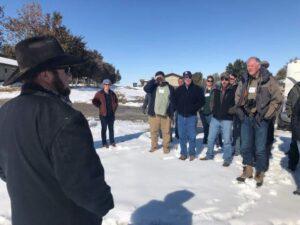
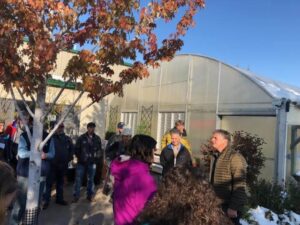
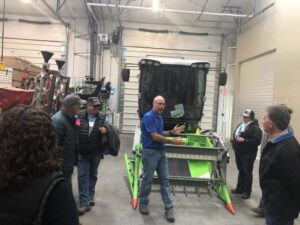
Benefits and Impacts of This Initiative
The impact and benefit of farm and industry tours is at the core of the professional development grant program. This is basic professional development where attendees learn valuable skills; obtain real-time information; explore new crops, markets and visions; learn new and innovative ways of practicing sustainable agriculture; and to network with other professionals to brainstorm and discuss educational outreach efforts region-wide. This interaction among agricultural professionals impacts farmers/ranchers and communities through information exchange about such topics as value-added enterprises, positive cash flow, improved business opportunities, greater environmental sustainability, greater productive potential, improved agriculture and food system infrastructure, and improved quality of life.
In response to the COVID outbreak, the Montana PDP program identified ways to use technology as a method to deliver professional development content to producers and constituents through online programming efforts. Online programming allowed for professional agriculturalists to deliver educational content during a time when in-person meeting were not appropriate.
In 2020 the COVID virus presented all new challenges to the delivery of professional development trainings and programming in Extension offices across the state of Montana. The Montana PDP Implementation committee developed and offered a new call for proposal for mini-grants to buy technology that would help agricultural educators reach their audiences and participants virtually during the challenges of the COVID virus outbreak, when in-person instruction and meetings were not happening.
The technology mini-grants offered approximately $1,000 dollars to county Extension offices to purchase technology related to the remote delivery of sustainable agriculture content via internet broadcasts. Nine offices applied for grant funding for technology. A total of $7,824.00 was awarded for the technology grant purposes.
Four offices purchased Own Pro meeting cameras, allowing for the broadcast of hybrid style meetings where some participants were in-person and some were remotely watching online.
Two offices applied for funding for small video recording equipment to record and release educational videos to teach concepts.
A regional group of Extension educators invested funds in professional training on how to effectively develop and deliver online learning opportunities from a consultant.
The Fort Belknap Tribal Extension office purchased a laptop and textbooks to set up a remote Master Gardener class and training program in a small community for class members to be able to access the technology at a location, in this instance the General Store, that had internet service for online programming.
One County office used funds to purchase a projector, microphone, and projection screen so meetings could be digitized and broadcast in larger rooms.
Offices purchased technology supplies with the grant funds in the winter of 2021. They began utilizing the new technology to hold virtual meetings and online trainings to meet the needs of their county constituents. One of the unintended opportunities and benefits of these small technology grants was in helping small counties connect with constituents for many different reasons. Extension offices in some counties became a resource for other county entities to get out important information through online services using the newly acquired technology. The grant funds literally supported many county functions as the needs would arise in the counties.
Impact statements from local offices:
Broadwater County Office:
The Meeting OWL that we purchased through the grant is used frequently. In addition to it being used for Extension programs, it is also used often by the County Commissioners, the local hospital and community groups. It does a superior job with audio and visual compared to other video conference systems. As far as a impact related to sustainable ag, I used it for the entire Master Gardener Level 2 series in the spring. The course was offered both in-person and virtually to participants. A majority of my speakers also participated virtually. The technology really did a good job to help us all connect, conduct programs and offer pertinent information. This summer, the OWL was also in DES Local Emergency Planning Committee meeting related to the local fire which is affected ag producers. We’ve also used it for many 4-H meetings.
The OWL really has been an asset to the office, and I appreciate the opportunity to purchase the equipment through the grant!
Fort Belknap Reservation Tribal Office:
The laptop in Lodgepole has provided one of our community members access to research-based information to support the success of the community garden and MSU Research Orchard. Barb has been able to use the laptop regularly to investigate sustainable ag techniques and virtual tools. Even with our drought conditions, we will enjoy a good apple harvest soon!
Teton County Office:
We have found that the Meeting Owl purchased from our WSARE Grant is a great help! It has been used multiple times since it’s purchase. It was used for 2 monthly hybrid club meetings that served an average of 20 individuals per meeting. It assisted the organization of our fair throughout the spring as it was utilized at 4 monthly Livestock Committee Meetings. This ensured we had a quorum without asking volunteers to travel or have to meet in person. The Yeti microphone has been used by a community member for a PhD project. It is also helpful for voiceover recordings for video programs being developed for 4-H and Agricultural topics here in Teton County.
It doesn’t seem like a lot but it did make a positive difference for us!
Allocating a portion of our state implementation grant to the purchase of the technology supplies helped our agricultural professionals respond and adapt to the unfolding COVID landscape and to continue to support their county constituents and producers during the time when it was unsafe to gather for in-person experiences. The technology has been used widely for educational purposes and continues to support communities as they adapt to a new normal in the way they approach education, outreach, and communication with community members across a county.
Educational & Outreach Activities
Participation summary:
Learning Outcomes
Project Outcomes
Face of SARE
The face of SARE was promoted through the direct training of producers and Extension professionals on the Marshall Islands during the Coordinator meetings which were held in Guam in 2019. I was sent to the Marshall Islands with a team of 4 other coordinators to help bring sustainable farming practices to the islanders in order to improve economic, environmental, and social sustainability to the people of the Micronesian nation. My colleagues and I spent 2 days providing classes on how to write grants for WSARE projects, how to identify projects to fund, and how to implement grant funds. We also spent 2 days demonstrating techniques and strategies to improve their sustainability through agriculturally sound practices such as sheet mulching, composting, organic and synthetic fertilizer applications, new crops for markets, and farm-to table ideals. We trained 23 people, including 6 Extension staff and 2 research scientists in these practices.
SARE was promoted through the use of the logo on all documentation related to the workshops, tours, demonstrations and travel scholarships awarded through the Montana mini-grant program. SARE was also promoted through the use of promotional items such as literature, hats, flash drives, and portable chargers that were given away at events. Publications and factsheets were offered at the workshops and training sessions and through one-on-one consultations.